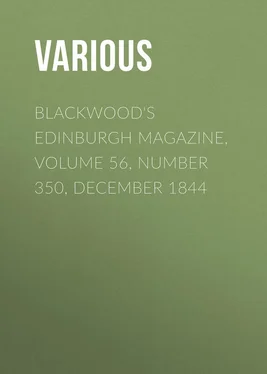Various - Blackwood's Edinburgh Magazine, Volume 56, Number 350, December 1844
Здесь есть возможность читать онлайн «Various - Blackwood's Edinburgh Magazine, Volume 56, Number 350, December 1844» — ознакомительный отрывок электронной книги совершенно бесплатно, а после прочтения отрывка купить полную версию. В некоторых случаях можно слушать аудио, скачать через торрент в формате fb2 и присутствует краткое содержание. Издательство: Иностранный паблик, Жанр: periodic, foreign_edu, Путешествия и география, на английском языке. Описание произведения, (предисловие) а так же отзывы посетителей доступны на портале библиотеки ЛибКат.
- Название:Blackwood's Edinburgh Magazine, Volume 56, Number 350, December 1844
- Автор:
- Издательство:Иностранный паблик
- Жанр:
- Год:неизвестен
- ISBN:нет данных
- Рейтинг книги:4 / 5. Голосов: 1
-
Избранное:Добавить в избранное
- Отзывы:
-
Ваша оценка:
- 80
- 1
- 2
- 3
- 4
- 5
Blackwood's Edinburgh Magazine, Volume 56, Number 350, December 1844: краткое содержание, описание и аннотация
Предлагаем к чтению аннотацию, описание, краткое содержание или предисловие (зависит от того, что написал сам автор книги «Blackwood's Edinburgh Magazine, Volume 56, Number 350, December 1844»). Если вы не нашли необходимую информацию о книге — напишите в комментариях, мы постараемся отыскать её.
Blackwood's Edinburgh Magazine, Volume 56, Number 350, December 1844 — читать онлайн ознакомительный отрывок
Ниже представлен текст книги, разбитый по страницам. Система сохранения места последней прочитанной страницы, позволяет с удобством читать онлайн бесплатно книгу «Blackwood's Edinburgh Magazine, Volume 56, Number 350, December 1844», без необходимости каждый раз заново искать на чём Вы остановились. Поставьте закладку, и сможете в любой момент перейти на страницу, на которой закончили чтение.
Интервал:
Закладка:
But the attitude which the ministry assumed was so formidable, and the prospect of a sweeping change so alarming, that the bankers were forced in self-defence, though sorely against their will, to make preparation for the worst contingencies. They were, so to speak, compelled to follow the example of England in 1745 – to recall all their outlying forces from abroad, concentrate them at home, and leave their allies to fight their own battles as they best could, and to conquer or fall according to their ability or weakness. Their first step was rigidly to refuse the granting of any new cash-credits; their second, to withdraw – with as much tenderness as might be, but still to withdraw – those which were already in existence. It was then that the country at large began to feel how terribly their interests were compromised. The trader, who was driving an active business on the strength of his cash-credit, and turning over the amount of his bank-account it may be thirty times in the course of the year, found himself suddenly brought to a stand-still. The country gentleman, in the midst of his agricultural improvements, and at the very moment when their cessation would undo all that he had hitherto accomplished, was compelled either to desist for want of ready money, and throw his labourers on the parish, or to have recourse to the pernicious system of discounting bills at a ruinous rate of interest. The manufacturer, in despair, was reduced to close his works, and the operatives went forth to combine, or starve, or burn; for the hand of the ministry was upon them likewise, and their burden was sorer than their masters'.
These were the first fruits of the proposed metallic currency; and it soon became evident to all, that nothing was left for Scotland, if she wished to escape from universal ruin, but to offer a firm and most determined resistance. The struggle was felt throughout the length and breadth of the land to be one, which, if it did not actually involve existence, involved a greater commercial interest than had been at stake for more than a century before. The combination which took place in consequence was so extraordinary, that we may be pardoned if we express our wonder how any minister who witnessed it, can at this hour have the temerity to return to the charge. Party-spirit, always higher and keener in Scotland than elsewhere, was at once forgotten in the common cause. All ranks, from the peer to the peasant, rose up in wrath at the proposed innovation; and from every county, city, town, village, and corporation in the kingdom, indignant remonstrances were forwarded to the foot of the Throne, and to the Imperial Parliament of Great Britain. It was assuredly a dangerous experiment to make with a proud and jealous people. Old watchwords and old recollections, buried spells which it were safer to leave alone, began to revive amongst us; and many a lighter act of aggression, which had been passed over at the moment in silence, was then recalled and canvassed, and magnified into a serious grievance. In short, Scotland, from the bottom of her heart, felt herself most deeply insulted.
It was at this time that the celebrated letters of Malachi Malagrowther appeared. To the general sentiments contained in that work, we subscribe without the slightest hesitation. Strong language is usually to be deprecated, but there are seasons when no language can be too strong. We think meanly of the man who can sit down to round his periods, and prune his language, and reduce his feelings to the level of cold mediocrity, when he knows that the best interests of his country are at stake, and that he is her chosen champion. And such, most assuredly, and beyond all comparison, was Sir Walter Scott. He went into that conflict like a giant, in a manner that disdained conventionalisms; he neither begged, nor prayed, nor conceded, but took his firm ground on the chartered liberties of his country, and spoke out in such manly and patriotic accents as Scotland has rarely heard since the days of Fletcher and Belhaven. All honour be to his memory! Were it for that good work alone, his name ought for ever to be immortal.
In consequence, ministry were condescending enough to allow a Parliamentary enquiry. Even that was not granted readily, as the prevailing impression in the cabinet seemed to be, that Scottish affairs were of too slight importance to occupy the time of the Imperial Parliament. The old country might be dealt with summarily, and left to remonstrate at its leisure. But the spirited resistance of our representatives, and it is no less incumbent upon us to add, that innate sense of justice in Englishmen, which will not suffer any one to be condemned unheard, procured us the investigation, upon the issue of which we were willing to rest our cause. The Scottish banking system underwent the severest of all scrutinies before committees of the Houses of Peers and of the Commons; and the following was the nature of the reports.
The committee of the House of Commons, after recapitulating the leading points which were brought out in evidence before them, came to the following conclusions – which it is very important to bring before the public now, as they refer not only to the deductions which the committee had formed from the history of the past, but to the special reasons which were to influence the legislature in future and prospective change.
"Upon a review of the evidence tendered to your committee, and forming their judgment upon that evidence, your committee cannot advise that a law should now be passed, prohibiting, from a period to be therein determined, the future issue in Scotland of notes below five pounds: —
"There are, in the opinion of your committee, sufficient grounds in the experience of the past for permitting another trial to be made of the compatibility of a paper circulation in Scotland with a circulation of specie in this country.
"Looking at the amount of notes current in Scotland, below the value of five pounds, and comparing it with the total amount of the paper currency of that country, it is very difficult to foresee the consequences of a law which should prohibit the future issue of notes constituting so large a proportion of the whole circulation .
"Your committee are certainly not convinced that it would affect the cash-credits to the extent apprehended by some of the witnesses; but they are unwilling, without stronger proof of necessity, to incur the risk of deranging, from any cause whatever, a system admirably calculated, in their opinion, to economize the use of capital, to excite and cherish a spirit of useful enterprise, and even to promote the moral habits of the people, by the direct inducements which it holds out to the maintenance of a character for industry, integrity, and prudence.
"At the same time that your committee recommend that the system of currency which has for so long a period prevailed in Scotland, should not, under existing circumstances, be disturbed, they feel it to be their duty to add, that they have formed their judgment upon a reference to the past, and upon the review of a state of things which may hereafter be considerably varied by the increasing wealth and commerce of Scotland, by the rapid extension of her commercial intercourse with England, and by the new circumstances that may affect that intercourse after the re-establishment of a metallic currency in this country.
"Apart from these general observations, bearing upon the conclusions at which they have arrived, there are two circumstances to which your committee must more particularly advert.
"It is evident that if the small notes issued in Scotland should be current beyond the Border, they would have the effect, in proportion as their circulation should extend itself, of displacing the specie, and even in some degree the local currency of England. Such an interference with the system established for England would be a manifest and gross injustice to the bankers of this part of the empire. If it should take place, and it should be found impossible to frame a law consistent with sound and just principles of legislation, effectually restricting the circulation of Scotch notes within the limits of Scotland, there will be, in the opinion of your committee, no alternative but the extension to Scotland of the principle which the legislature has determined to apply to this country.
Читать дальшеИнтервал:
Закладка:
Похожие книги на «Blackwood's Edinburgh Magazine, Volume 56, Number 350, December 1844»
Представляем Вашему вниманию похожие книги на «Blackwood's Edinburgh Magazine, Volume 56, Number 350, December 1844» списком для выбора. Мы отобрали схожую по названию и смыслу литературу в надежде предоставить читателям больше вариантов отыскать новые, интересные, ещё непрочитанные произведения.
Обсуждение, отзывы о книге «Blackwood's Edinburgh Magazine, Volume 56, Number 350, December 1844» и просто собственные мнения читателей. Оставьте ваши комментарии, напишите, что Вы думаете о произведении, его смысле или главных героях. Укажите что конкретно понравилось, а что нет, и почему Вы так считаете.












